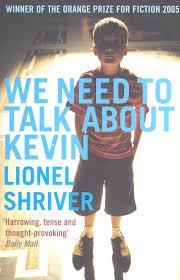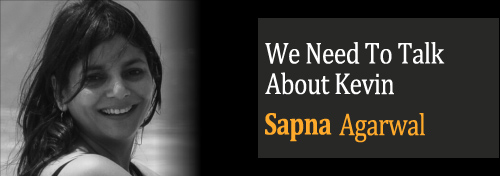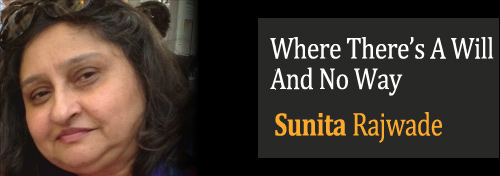We Need To Talk About Kevin
I recently read “we need to talk about Kevin”. It’s neither a particularly gripping book, nor very exciting and yet I found myself squeezing out time from my hectic schedule to finish it.
Kevin is a fifteen year old American boy who is in a correctional facility for killing 13 people, including nine of his classmates. The ‘fictional’ story unfolds in a series of letters that Kevin’s mother writes to her presumably estranged husband, Kevin’s father. It’s a gruesome story especially as the author reveals towards the end that the father was one of Kevin’s 13 victims.

I am not a big fan of gruesome stories. I think newspapers these days have too many of them already. But the perspective from which this one is written intrigued me. The mother claims that she noticed from the very beginning that there was ‘something’ about Kevin. That his meanness, his lack of emotional attachments, his selfishness, was evident even as a baby. She complains that her husband, (a very ‘involved’ and ‘attentive’ father), never really ‘saw’ Kevin as an individual with his own personality. Instead she says, he saw Kevin through a lens. He saw in Kevin an ‘ideal child’ because that’s what he wanted to see. She thinks he wanted to relive his own idea of a perfect childhood without really taking in account Kevin’s own disposition.
Was Kevin a born ‘sociopath’ as his mother claims or did he become one? The classic Nature VS Nurture debate. Are we given certain kind of children or do our children become a certain way because of us? How much is our role really in molding them? In creating their personalities?
The question becomes even more relevant in today’s trying times. Every day as I flip through the papers, stories about youngsters throwing acid on their girlfriends, adolescents killing themselves, boys raping their classmates, teenagers murdering their friends for petty sums leap out at me. Who are these children? Who are their parents? Aren’t they one of us? Didn’t they raise them like we raise our children? With love, hope, and a lot of faith! What went wrong then?
As a naive twenty year old I was quick to blame poor parenting for children’s behavioural problems. In my thirties now, as a parent of two children, having closely observed many parent-children relationships around me, I am slower to pass judgments. I have learned that some children are ‘difficult’ others are ‘aggressive’, some are ‘sweet as peas’ and others are ‘sissy’. There are as many ‘types’ as there are children and it’s impossible and even dangerous to pigeonhole them into any broad categories. And that’s what makes our role as parents even more challenging.
Just because a certain method of disciplining worked with Meena, there is no guarantee that it will work with Seema, her younger sister. Parenting has to be tailor-made. The same alcoholic father makes one child a violent drinker and the other a teetotaler.
Parenting is also about being observant. Observing the child’s body language, behavioural patterns, social interactions, listening to what they are saying and ‘not saying’. It is a tall order. But once we signed on for the second we saw that strip turn pink!
There are no easy answers. Or at least I don’t have any. All I can say is I am doing my best. Just like the rest of you. The rest as they say is in the hands of the higher power.
What do you think about the Nature Vs. Nurture debate? Which do you consider more powerful? Why?
When you read about youngsters who have been involved in a conflict with law. Do you blame their parents? How much?
A mom of two, Sapna is a business woman, an avid book lover, a stand in decorator for her restaurants, a movie buff, a social worker by training and a “change maker” by choice. A dreamer, like her name suggests, she says she is dangerously sentimental and an idealist at heart. Married to her childhood sweetheart she lives in a small city in Rajasthan with her kids Maya 8 yrs. and Kabir 7 yrs. She started blogging a year back and uses her blog justanotherwakeupcall to make new friends and connect with people.

